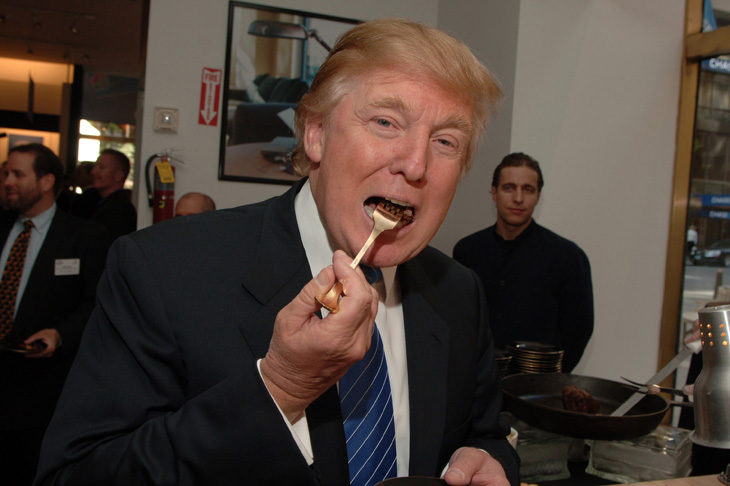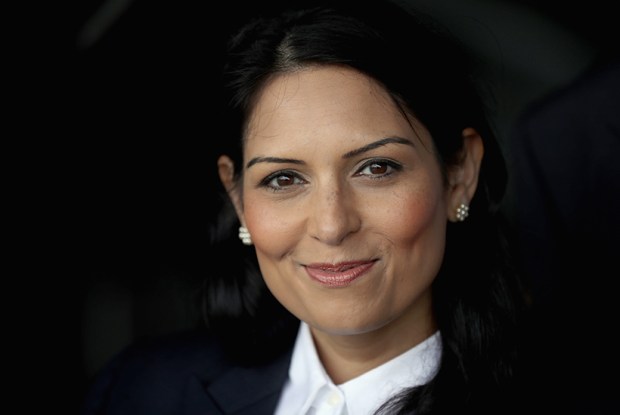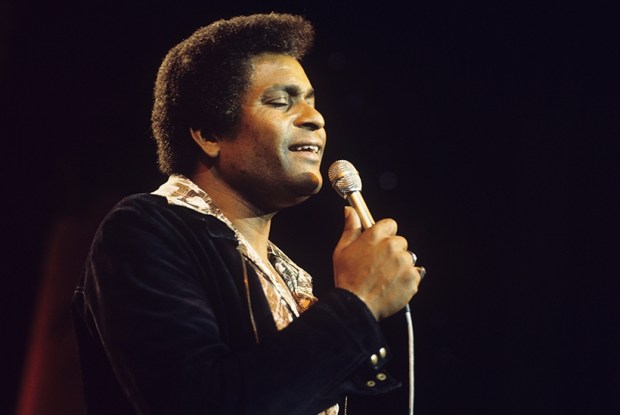The latest and perhaps most damaging accusation to be levelled at Donald Trump is that he likes his steaks well-done and accompanied with tomato ketchup. He was seen ordering exactly this dish last week. It would not surprise me if he also had a side order of battered onion rings.
I do not know if the person who cooked the steak was an immigrant and, this being the case, added a gobbet of alien phlegm to the griddle. If so, Trump didn’t seem to mind. He chomped away, dipping bits of incinerated meat in his ketchup, quite unconcerned that over here in Blighty a new sneerfest was rapidly getting underway. ‘The man’s a monster,’ someone tweeted. ‘He eats like my toddler and acts like him too,’ some dappy woman commented. You give your toddler steak? How does he like it? Au point with béarnaise and a crisp side salad (along with the ketchup)? I think we’re back dealing with the liberal elite once again.
The journalist Mick Hume has just written a book about that very thing (the liberal elite, not how to eat steak) and been eviscerated for it by denizens of the, er, liberal elite. No surprise then. The book is called Revolting: How the Establishment Are Undermining Democracy And What They’re Afraid Of and concerns itself principally with the establishment reactions to both the Brexit vote here and Trump’s victory in the USA.
First to stick the boot in was some woman called Helen Lewis in the Sunday Times, who either did not understand the book or — more likely — wilfully misunderstood it. Then it was our own Nick Cohen, reviewing the book for the Guardian. Nick was never going to like it, because he is, first, a staunch Remainer who was appalled by the vote last June and since then has been railing with increasing fury about how we’re all going to hell in a handcart as a consequence of that democratic decision. On this issue he’s a sort of reverse Richard Littlejohn, perpetually splenetic and beside himself.
But then, second, because he has an all-consuming loathing of the old Revolutionary Communist Party cadre who have turned themselves into entertaining anti-establishment libertarians at Spiked Online and the Institute of Ideas. The likes of Brendan O’Neill, Claire Fox, Frank Furedi and indeed Mick Hume. I have a scintilla of sympathy with Nick in his animus, even though some of my closest friends are part of that contrarian post-Marxist bloc. I am never entirely sure what they are actually for — even if their critiques of what they are against are pungent, often counter-intuitive and frankly very welcome.
Nick, who is also a friend and a writer I admire, made the same mistake in his furious annihilation of Hume as Lewis had made in hers. There is no liberal elite, they both insisted. It does not exist. Cohen went still further and offered Hume a short lesson in what constitutes an elite: political parties, effectively. And so, because we and the US are ruled by ‘right-wing’ governments, it is ludicrous to talk of a ruling liberal elite, or a liberal establishment.
Oh dear. This is so shallow a reading of the issue that it would not even tickle your toes. So I thought, reading Nick’s piece, that maybe I ought to offer a short lesson on what constitutes a real elite. Especially as I refer to it every week or so.
For a start, the elite is not liberal in the classical liberal sense, but closer to the American sense of the word. It is certainly not ‘liberal’ if by that you mean tolerant: it is intolerant and authoritarian. And by elite I do not mean the elected government: establishment elites can survive most forms of government and easily outlast them.
The liberal elite we talk about today is beholden to a leftish cultural and political paradigm which predominates in all the non-elected institutions which run our lives. In the judiciary, for example. Within the BBC. In the running of our universities and in the courses they put before students. In the teaching profession. In the social services departments of every council in the land. At the top of the medical profession. On the boards of all the quangos — the lot of them, from those which hand out money in the arts to those which regulate our media and our utilities. It is a left-liberal paradigm, informed by affluence, which has been swallowed whole by all of these institutions and which is utterly intolerant of dissent.
Try being a social worker who thinks gay adoptions are problematic. Or a doctor who disapproves of abortion or transitioning. Or a student who quite likes Germaine Greer and wearing a sombrero. Or a teacher who thinks Trump is maybe OK. (The headmaster at a school in south London recently told pupils that if any child uttered the same sorts of words as Donald Trump about immigration, they’d be excluded.)
Try being a judge who thinks an awful lot of hate crimes are imaginary or vexatious. In all cases you’d be drummed out. No job. You’d be finished. There would be tribunals — where you would be judged by other upholders of the liberal elite — and you’d be out.
That is what we mean by the liberal elite. The template for how our society is governed and which antithetical political parties may battle, but in the short to medium term, lose.
Elites do change, though. I remember as a speechwriter for the Labour party in the early 1980s suggesting that we do something in support of the teachers, who were complaining about pay. ‘Fuck them — they’re all Tories,’ I was told. And so statistically they were, at the time. And in the 1970s the BBC, the Church of England, the judiciary and the emergent quangos were small ‘c’ conservative. Elites last for about two generations. Our liberal elite has lasted since about 1985. And my guess is that right now it is on the way out, which is why we are hearing this continual howling.
Got something to add? Join the discussion and comment below.
Get 10 issues for just $10
Subscribe to The Spectator Australia today for the next 10 magazine issues, plus full online access, for just $10.
You might disagree with half of it, but you’ll enjoy reading all of it. Try your first month for free, then just $2 a week for the remainder of your first year.















Comments
Don't miss out
Join the conversation with other Spectator Australia readers. Subscribe to leave a comment.
SUBSCRIBEAlready a subscriber? Log in